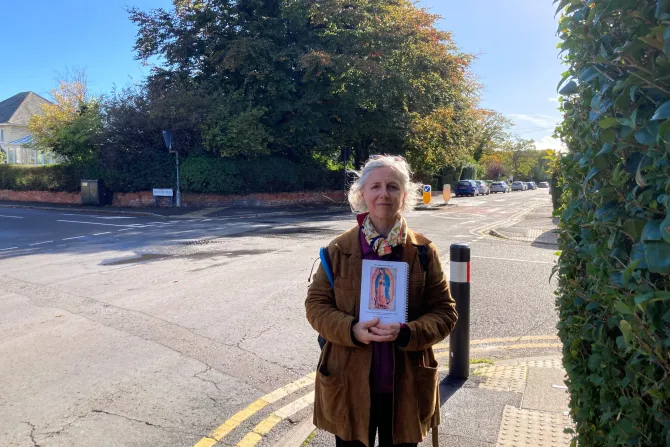Livia Tossici-Bolt says she was urged by council officers to “move on” after praying in public near an abortion center in Bournemouth, England. | ADF International
Pro-life and free-speech campaigners in the United Kingdom are awaiting a landmark ruling from the Supreme Court on Wednesday regarding censorship zones around abortion clinics.
The Northern Irish Assembly adopted the Abortion Services (Safe Access Zones) Northern Ireland Bill in March.
However, Northern Ireland’s attorney general, Dame Brenda King, referred the bill to the Supreme Court out of concern that it was incompatible with fundamental freedoms enshrined in the European Convention on Human Rights.
The bill in question prohibits “direct” and “indirect” pro-life “influence” within a 100-meter vicinity of abortion premises. It stands to criminalize quiet or silent prayer along with the distribution of leaflets that offer women alternatives to abortion.
It is anticipated that the decision of the Supreme Court will likely influence the direction of similar legislation in Scotland and Westminster.
Before the passing of the controversial legislation in March, Alina Dulgheriu, who was once the recipient of pro-life support and is a member of the Be Here For Me Campaign, spoke out against the legislation.
In a statement released on March 21, she said: “You don’t have to disagree with abortion to see that simply offering alternatives should be legally permissible.”
“The day that I turned up to my abortion appointment, a volunteer outside the clinic gave me a leaflet. It offered the help that I had been searching [for].”
“I weighed up the two options I had before me, and I chose motherhood,” Dulgheriu said. “I chose to accept help to get housing, help to find a job, and help to obtain a pram, a cot, and nappies. It wasn’t easy. But with the support of the group who had given me that leaflet, I couldn’t be prouder of the life my daughter and I have charted out together.”
“Now back on my feet, I pass on the favour by going back out onto the streets near abortion clinics to offer help to other women who want support,” she added.
“Don’t dismiss my case as a one-off. There are hundreds of women just like me who have benefited, both here in London, where I live, and in Northern Ireland.”
Meanwhile, parliamentarians in England and Wales have also conveyed concern about the direction of religious freedom within their jurisdiction as the Public Order Bill makes its way through Parliament.
Clause 9 of the bill proposes to institute “buffer zones” around abortion clinics nationwide, which campaigners argue would have a detrimental impact on outreach for women facing crisis pregnancies while raising fundamental questions concerning freedom of religion and expression.
Clause 9 faced notable scrutiny in the House of Lords on Nov. 22 as peers across the political spectrum expressed their unease with the introduction of buffer zones.
According to a statement from ADF International, Clause 9 of the Public Order Bill prohibits not only “harassment” outside of abortion facilities but “informing,” “advising,” “influencing,” “persuading,” and even “expressing an opinion.”
Source: CNA

